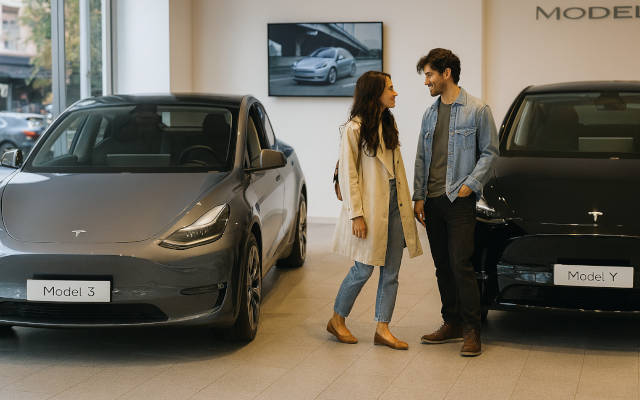 EDITOR'S PICK
EDITOR'S PICK
Hear Me Out: Instead of Faster Chargers, We Should Lobby for Slower Gas Pumps
12 Oct 2025 | Synopsis
 Tongue-in-cheek article argues that instead of demanding faster EV chargers, we should slow down gas pumps to equalize refueling times, while reducing evaporative emissions. It highlights how EV charging is often criticized for being slower than gas refueling, but reframes the issue by suggesting that slowing gas pumps would make EVs seem just as convenient if not more so. The piece uses satire to challenge perceptions and promote EV adoption.
Tongue-in-cheek article argues that instead of demanding faster EV chargers, we should slow down gas pumps to equalize refueling times, while reducing evaporative emissions. It highlights how EV charging is often criticized for being slower than gas refueling, but reframes the issue by suggesting that slowing gas pumps would make EVs seem just as convenient if not more so. The piece uses satire to challenge perceptions and promote EV adoption.The Worrisome Trend of the eVTOL Business Model
12 Oct 2025 | Synopsis
 eVTOL aircraft face serious business viability issues. GlobeAir's CEO stated there's "no business case" for wide-scale adoption after a failed Lilium partnership. The main problem: battery technology and lack of charging infrastructure at airports make operations economically unviable with "insane" hourly battery replacement costs. Aviation is already a low-margin business, and experimental technology faces high insurance costs.
eVTOL aircraft face serious business viability issues. GlobeAir's CEO stated there's "no business case" for wide-scale adoption after a failed Lilium partnership. The main problem: battery technology and lack of charging infrastructure at airports make operations economically unviable with "insane" hourly battery replacement costs. Aviation is already a low-margin business, and experimental technology faces high insurance costs. Auto Giant Stellantis Unveils Revolutionary Battery System Unlocking New EV Era
09 Oct 2025 | Synopsis
 Stellantis unveiled its Intelligent Battery Integrated System (IBIS), merging inverter and charger into the battery for a lighter, more efficient EV powertrain. IBIS boosts energy efficiency by 10%, power output by 15%, and cuts charging time by 15%. Tested in a Peugeot E-3008, it saves weight and space, simplifies maintenance, and eases reuse for energy storage. Stellantis aims for integration by 2030.
Stellantis unveiled its Intelligent Battery Integrated System (IBIS), merging inverter and charger into the battery for a lighter, more efficient EV powertrain. IBIS boosts energy efficiency by 10%, power output by 15%, and cuts charging time by 15%. Tested in a Peugeot E-3008, it saves weight and space, simplifies maintenance, and eases reuse for energy storage. Stellantis aims for integration by 2030.2027 Chevrolet Bolt: The Comeback Kid of Affordable EVs
09 Oct 2025 | Synopsis
 The 2027 Chevrolet Bolt returns as an affordable EV starting at $28,995, now with 150kW fast charging (10–80% in 26 mins), 210 hp, and 255-mile range. Built on the EUV platform, it offers more cargo space and updated tech, including an 11.3" touchscreen and optional Super Cruise. Three trims - LT, LT Comfort, and RS - launch in early 2026 from GM’s Kansas plant.
The 2027 Chevrolet Bolt returns as an affordable EV starting at $28,995, now with 150kW fast charging (10–80% in 26 mins), 210 hp, and 255-mile range. Built on the EUV platform, it offers more cargo space and updated tech, including an 11.3" touchscreen and optional Super Cruise. Three trims - LT, LT Comfort, and RS - launch in early 2026 from GM’s Kansas plant.Tesla's "Cheaper" Sub-$40K Model 3 and Model Y
09 Oct 2025 | Synopsis
 Tesla's new Model 3 and Model Y “Standard” variants, priced under $40K, offer strong range (321 miles) and core tech but cut premium features like powered seats, upgraded audio, and dual motors. The Model 3 is quicker and cheaper, ideal for commuters; the Model Y suits families. Deliveries begin late 2025. While TSLA stock dipped on launch, these models may boost volume and affordability without reinventing the platform.
Tesla's new Model 3 and Model Y “Standard” variants, priced under $40K, offer strong range (321 miles) and core tech but cut premium features like powered seats, upgraded audio, and dual motors. The Model 3 is quicker and cheaper, ideal for commuters; the Model Y suits families. Deliveries begin late 2025. While TSLA stock dipped on launch, these models may boost volume and affordability without reinventing the platform.
 EVWorld Exclusive
EVWorld Exclusive
Sticker Shock and Stagnant Pay: Why New Cars Are Slipping Out of Reach
17 Oct 2025 |  New car prices have outpaced wage growth, making ownership increasingly unaffordable. Even Ford's $30K EV pickup and other sub-$30K models may remain out of reach for many without incentives or financing reform. With monthly payments rising and federal credits phasing out, the affordability gap is reshaping the auto market. Shared mobility and micro-EVs may offer alternatives, but structural change is needed to restore access.
New car prices have outpaced wage growth, making ownership increasingly unaffordable. Even Ford's $30K EV pickup and other sub-$30K models may remain out of reach for many without incentives or financing reform. With monthly payments rising and federal credits phasing out, the affordability gap is reshaping the auto market. Shared mobility and micro-EVs may offer alternatives, but structural change is needed to restore access.
Toyota FT-Me: Shared Mobility Concept with Big Implications
17 Oct 2025 |  Toyota's FT-Me is a two-seat electric microcar designed for shared urban mobility, not just teens. Developed with UK government support, it features hand-only controls, solar panels, and a lightweight frame. Aimed at car clubs and last-mile use, it could offer affordable, accessible transport with low emissions. With steady utilization and supportive policy, FT-Me may become a viable, sustainable option in the UK's evolving mobility landscape.
Toyota's FT-Me is a two-seat electric microcar designed for shared urban mobility, not just teens. Developed with UK government support, it features hand-only controls, solar panels, and a lightweight frame. Aimed at car clubs and last-mile use, it could offer affordable, accessible transport with low emissions. With steady utilization and supportive policy, FT-Me may become a viable, sustainable option in the UK's evolving mobility landscape.
Creative Destruction vs. Fossil Retrenchment: Why Project 2025 Risks Leaving America Behind
16 Oct 2025 |  Project 2025 protects fossil fuel incumbents by dismantling Biden-era clean energy policies. Nobel economist Philippe Aghion argues that climate progress depends on creative destruction - letting green innovators outcompete legacy polluters. The U.S. risks falling behind as global markets embrace clean tech. Even its passport has slipped from the top 10. Innovation, not retrenchment, is the path forward
Project 2025 protects fossil fuel incumbents by dismantling Biden-era clean energy policies. Nobel economist Philippe Aghion argues that climate progress depends on creative destruction - letting green innovators outcompete legacy polluters. The U.S. risks falling behind as global markets embrace clean tech. Even its passport has slipped from the top 10. Innovation, not retrenchment, is the path forward
Buick Electra E5: China-Built EV Poised for U.S. Launch
16 Oct 2025 |  Buick's Electra E5, built in China by SAIC-GM, is set to become GM's first imported EV for the U.S. market. Though its launch was delayed indefinitely in 2024, a tentative 2026 rollout remains part of GM's electrification roadmap. With Ultium battery tech, strong performance specs, and positive reception in China, the Electra E5 represents a strategic shift in global EV sourcing and branding.
Buick's Electra E5, built in China by SAIC-GM, is set to become GM's first imported EV for the U.S. market. Though its launch was delayed indefinitely in 2024, a tentative 2026 rollout remains part of GM's electrification roadmap. With Ultium battery tech, strong performance specs, and positive reception in China, the Electra E5 represents a strategic shift in global EV sourcing and branding.
China's EV Boom Masks a Hidden Inventory Problem
15 Oct 2025 |  China's EV market shows strong wholesale growth, but retail sales lag behind. In April 2025, the wholesale-retail ratio hit 1.27:1, signaling inventory buildup. Automakers push stock to dealers to meet targets, risking oversupply. Analysts warn this gap could lead to price wars and financial strain. Retail data offers a clearer view of consumer demand and market health.
China's EV market shows strong wholesale growth, but retail sales lag behind. In April 2025, the wholesale-retail ratio hit 1.27:1, signaling inventory buildup. Automakers push stock to dealers to meet targets, risking oversupply. Analysts warn this gap could lead to price wars and financial strain. Retail data offers a clearer view of consumer demand and market health.
SEARCH RSSTREAM
 58 New Postings In Past 24 Hours
58 New Postings In Past 24 Hours
Category:energy
Region:NoAmerica
Date:17 Oct 2025
Category:mobility
Region:NoAmerica
Date:17 Oct 2025
Category:mobility
Region:Europe
Date:17 Oct 2025
Category:energy
Region:Global
Date:17 Oct 2025
Category:mobility
Region:Europe
Date:17 Oct 2025
Category:autonomy
Region:NoAmerica
Date:17 Oct 2025
Category:finance
Region:AsiaPacific
Date:17 Oct 2025
Category:finance
Region:NoAmerica
Date:17 Oct 2025
Category:finance
Region:NoAmerica
Date:17 Oct 2025
Category:mobility
Region:AsiaPacific
Date:17 Oct 2025
Category:environment
Region:Global
Date:17 Oct 2025
Category:mobility
Region:Europe
Date:17 Oct 2025
Category:energy
Region:AsiaPacific
Date:17 Oct 2025
Category:energy
Region:AsiaPacific
Date:17 Oct 2025
Category:mobility
Region:NoAmerica
Date:17 Oct 2025
Category:energy
Region:NoAmerica
Date:17 Oct 2025
Category:mobility
Region:Europe
Date:17 Oct 2025
Category:mobility
Region:NoAmerica
Date:17 Oct 2025
Category:mobility
Region:Global
Date:17 Oct 2025
Category:finance
Region:NoAmerica
Date:17 Oct 2025
